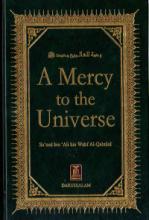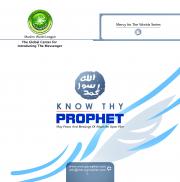The Prophet of Mercy Website
Muslim World League - Global Commission for Introducing the Messenger
By M. Abdulsalam
Religious Autonomy and Politics
Description: Many mistakenly believe that Islam does not tolerate the existence of other religions present in the world. This article discusses some of the foundations the Prophet Muhammad r himself laid in dealing with people of other faiths, with a practical examples from his lifetime.
Part 2: More examples from the Prophet’s life which portray his tolerance of other religions.
There are many other examples during the lifetime of the Prophet r in addition to the Sahifah that practically portray the tolerance Islam shows for other religions.
Freedom of Religious Assembly and Religious Autonomy
Given consent by the constitution, the Jews had the complete freedom to practice their religion. The Jews in Madinah at the time of the Prophet r had their own school of learning, named Bait-ul-Midras, where they would recite the Torah, worship and educate themselves.
The Prophet r emphasized in many letters to his emissaries that religious institutions should not be harmed. Here in a letter addressed to his emissary to the religious leaders of Saint Catherine in Mount Sinai who sought the protection of the Muslims:
“This is a message from Muhammad ibn ‘Abdullah, as a covenant to those who adopt Christianity, near and far, we are with them. Verily I, the servants, the helpers, and my followers defend them, because Christians are my citizens; and by God! I hold out against anything that displeases them. No compulsion is to be on them. Neither are their judges to be removed from their jobs nor their monks from their monasteries. No one is to destroy a house of their religion, to damage it, or to carry anything from it to the Muslims’ houses. Should anyone take any of these, he would spoil God’s covenant and disobey His Prophet. Verily, they are my allies and have my secure charter against all that they hate. No one is to force them to travel or to oblige them to fight. The Muslims are to fight for them. If a female Christian is married to a Muslim, it is not to take place without her approval. She is not to be prevented from visiting her church to pray. Their churches are declared to be protected. They are neither to be prevented from repairing them nor the sacredness of their covenants. No one of the nation (Muslims) is to disobey the covenant till the Last Day (end of the world).”
As one can see, this Charter consisted of several clauses covering all important aspects of human rights, including such topics as the protection of minorities living under Islamic rule, freedom of worship and movement, freedom to appoint their own judges and to own and maintain their property, exemption from military service, and the right to protection in war.
On another occasion, the Prophet r received a delegation of sixty Christians from the region of Najran, then a part of Yemen, at his mosque. When the time for their prayer came, they faced the direction of east and prayed. The Prophet r ordered that they be left in their state and not harmed.
Politics
There are also examples in the life of the Prophet r in which he cooperated with people of other faiths in the political arena as well. He selected a non-Muslim, Amr ibn Umaiyah ad-Damri, as an ambassador to be sent to Negus, the King of Ethiopia.
These are only some of the examples of the Prophet’s tolerance of other faiths. Islam recognizes that there are a plurality of religions on this earth, and gives the right to individuals to choose the path which they believe to be true. Religion is not to be, and was never, forced upon an individual against their own will, and these examples from the life of the Prophet r are an epitome of the verse of the Qur'an which promotes religious tolerance and sets the guideline for the Muslims’ interaction with people of other faiths.
Allah says:
“There is no compulsion in religion” (Qur'an 2:256)
Source: http://www.islamreligion.com/a
Edited by the Prophet of Mercy team
******






